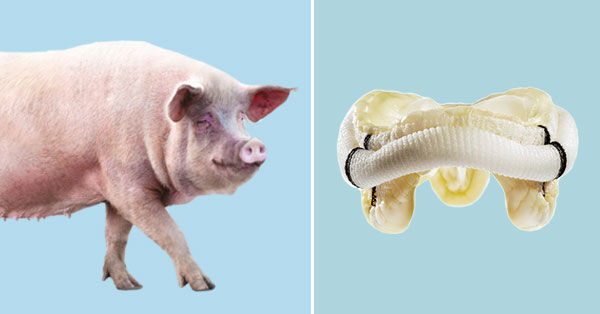Morbid Distaste Over Medical Advance in Xenografting...?
"...But then I thought, 'Well, why not use someone who is now dead due to brain death, and we know they're dead' -- that's absolutely clear. We could minimize the risk to the first human that we're really going to try to transplant.""I asked our docs, could you learn from this? And they said, you're right. We could.""The family was very enthusiastic. I certainly would not want to be doing it without the family saying, 'This is something my loved one would want to do, and we fully support it.""The answer is, they are really dead, and you can do experiments because we have the means artificially to keep major body organs and cells working even when the person has passed away."Arthur Caplan, medical ethicist, NYU Langone Health, New York City"If the public gets the impression that organ donation could lead to something like this, people may find this very disturbing.""There are many people in our society that would not consider someone that is brain-dead and still with a heartbeat and perfusing and blood flowing as being completely dead.""But I also see the potential is there to save a lot of lives if it were successful.""Some people would say this is as disrespectful of the dead as anything can be and others would say it's not. I think the yuck factor -- I'm using a very unscientific term here -- would be quite high with the public."Kerry Bowman, medical ethicist, Family and Community Medicine, University of Toronto
 |
| A genetically engineered pig kidney appears healthy during a transplant operation at NYU Langone in New York, US, in this undated handout photo. — Reuters |
There are laws and regulations that cover ethics in medical practise in specific focus on the living. None exist of a similar nature to govern research on humans that apply to the brain-dead. People are urged to sign organ-donor cards, permitting their organs on death to be harvested and used for human organ transplant, a vital life-saving program that gives new meaning to 'saving a life'. But there are never sufficient numbers of volunteered organs to supply the urgent needs of people awaiting organ transplant and many die during that agonizing wait period.
The question being raised is whether those same people who so generously see their organs being used to extend the lives of other seriously ill people, could ever foresee and be comfortable with the prospect that their own dead body might be maintained in an organ-functioning state despite their having departed that body, for research and experimental purposes. Whether they might differentiate 'saving a life' with their organs used in desperate medical straits, or their entire body and its in situ organs being used to advance medical science.
In September at NYU Langone, surgeons incised the upper leg of a brain-dead woman to attach a pig kidney to her blood vessels. An experiment in the potential of using a genetically modified pig in lieu of a human organ to extend a life when a person's natural kidneys stop functioning. Transplanting an organ from another species -- even so a pig whose genetics are so close to that of humans -- would normally result in the body's immune system instantly rejecting the intruder organ and death would quickly follow.
In this case, the pig's genetic makeup had been altered to exclude a triggering sugar molecule, called alpha-gal to prevent rejection. It took three days while the kidney was attached to the brain-dead subject's blood vessels where researchers had access to it outside the body, and no "hyper-acute" rejection occurred. Maintained on a ventilator for 54 hours, surgeons watching for symptoms of rejection. The kidney functioned like a normal human kidney, producing urine, cleansing blood.
 |
Dr.Caplan's theory that the use of a brain-dead body for a brief experiment in pig organ functionality transplanted into a human body without rejection resulting, which he discussed at length and intimately with surgeons at his medical facility proved a success. Dr.Caplan published a paper in 2019 with a colleague, who is an attorney and medical ethicist, along with other members of the NYU Medical Ethics Working Group on Research on the Recently Deceased.
Writing that the procedure "can seem frightening or abhorrent", raising complex ethical challenges "It is appropriate for experimentation to be done in humans due to the potential for cross-species complications, if they were to be studied in other animals." The understanding that for some people transplanting animal organs into people is not an agreeable prospect, aside from the fact that some people find it difficult to accept that brain death equals total body/brain death.
Yet we eat pigs as part of our normal diets. We are what we eat. In consuming animals something of them is integrated within ourselves; we are sustained physically by ending their lives to continue ours. Materials derived from pigs have long been used in furthering human life, from the production of insulin to heart valve replacements, the choice of which can be pig tissues or carbon-material valves. Biological or mechanical heart valve replacement...
 |
| Epic Pig Valve Replacement (Abbott Laboratories) |
Labels: Experiments, Medical Ethics, Organ Transplants, Research

0 Comments:
Post a Comment
<< Home